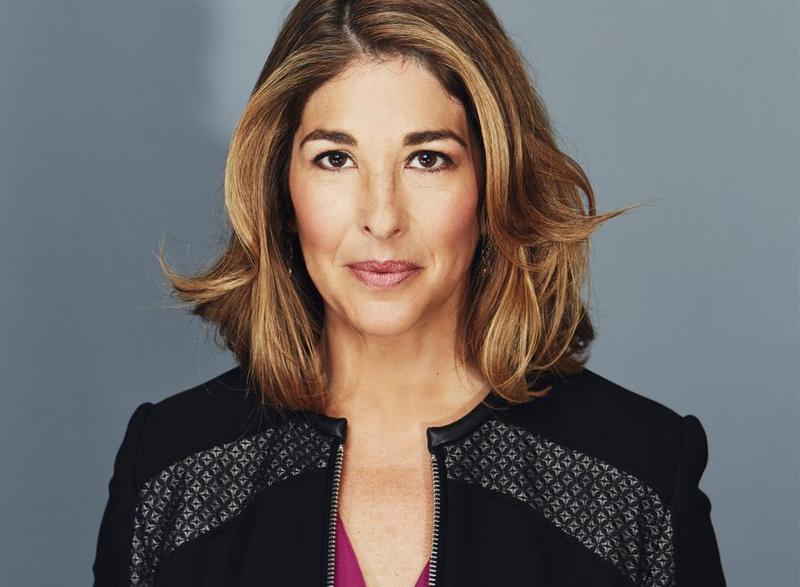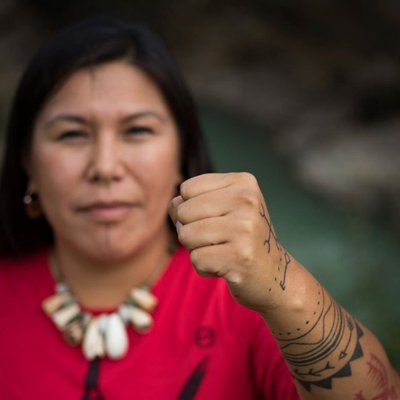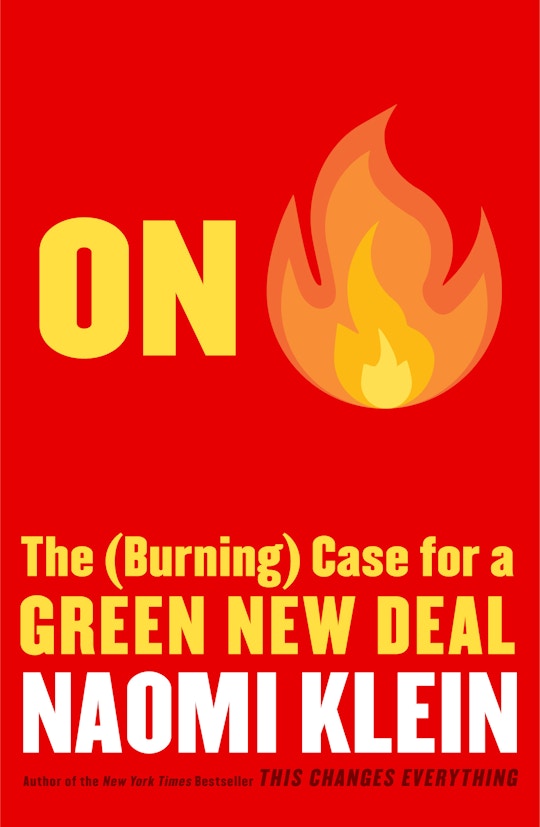The intellectual godmother of the Green New Deal movement laid out what, exactly, such a plan must entail to be successful.
Naomi Klein appears on Democracy Now! with Amy Goodman. (YouTube s
California burned. The Amazon burned. Greenland burned. Siberia burned. Indonesia burned. Australia’s ongoing fires look hellish.
Now, last year’s global inferno looks to Naomi Klein, the author and intellectual godmother of the Green New Deal movement, like a lit fuse to a fascist future.
“We’re in a moment where we are literally flammable,” Klein, whose latest book “On Fire: The Burning Case for a Green New Deal” was published in September, said on a recent afternoon. “But we are also politically flammable.”
In 2019, some factions of the global far-right that gained power in the past decade started to abandon their traditional climate denialism and adopt new rhetoric that looks increasingly eco-fascist, an ideology that defends its violent authoritarianism as necessary to protect the environment.
In France, the leader of the far right, Marine Le Pen, refurbished Nazi-era blood-and-soil rhetoric in a pledge to make Europe the “world’s first ecological civilization,” drawing a distinction between the “ecologist” social groups who are “rooted in their home” and the “nomadic” people who “have no homeland” and “do not care about the environment.” In Germany, the anti-immigrant Alternative for Germany party’s Berlin youth wing urged its leaders to abandon climate denialism. The manifestos posted online by the alleged gunmen in massacres from Christchurch, New Zealand, and El Paso, Texas, explicitly cited climate change as a motivation for murdering immigrants and minorities.
“This is what it means to have people so close to the edge,” Klein said. “There is a rage out there that is going to go somewhere, and we have demagogues who are expert at directing that rage at the most vulnerable among us while protecting the most powerful and most culpable.”
The solution, she said, is to enact the kind of Green New Deal that progressives in the United States and elsewhere started fleshing out over the past year. The proposal ― more of a framework than a policy ― calls for the most generous expansion of the social safety net in decades. It promises good-paying, federally backed jobs for workers displaced by the transition away from fossil fuels, and those struggling to get by with stagnant wages and insecure gig-economy and retail jobs.
Klein, a journalist and author whose work over the past decade thrust pointed critiques of capitalism into the mainstream debate over climate change, has campaigned in recent months for Sen. Bernie Sanders (I-Vt.) as he runs for the 2020 Democratic nomination on a platform that includes a sweeping, $16.3 trillion Green New Deal.
HuffPost sat down with Klein to discuss her latest book and what comes next in the climate fight.
In Spain, there are competing versions of a Green New Deal. In New York, Democratic Gov. Andrew Cuomo called his clean energy proposal a “green new deal.” The European Commission is pushing a “green deal.” Are you worried about Green New Deal branding being coopted by advocates of austerity and centrism? How do you fight back against that?
Any phrase can be coopted and watered down. The main reason why I wanted to write the book is to help define what a transformational Green New Deal has to mean, to put more details out there. Any vague proposal is vulnerable to what you’re describing. The reason why I’m using the phrase now is because it is being used in a climate-justice context and the parameters that have been put around it by the resolution sponsored by Rep. Alexandria Ocasio-Cortez (D-N.Y.) and Sen. Ed Markey (D-Mass.) — and further supported by the Sanders campaign and Sen. Elizabeth Warren’s (D-Mass.) and Washington Gov. Jay Inslee’s (D) campaigns — have made it more detailed.
Canadian author and activist Naomi Klein speaks to the media before speaking at the Willy Brandt Foundation in December. CARSTEN KOALL VIA GETTY IMAGES
But I still think there are parts of the discussion that we need to talk about — like the danger of a Green New Deal inadvertently failing to lower emissions in line with what scientists are telling us we need to do, and what sort of mechanisms need to be in place to prevent a carbon bubble that could be generated by rolling out a bunch of new infrastructure and creating a whole bunch of jobs.
How has the emergence of the Green New Deal changed the way we talk about neoliberalism? The movement seems to take the governing ideology of the past five decades as a given, yet we still have certain pundits questioning whether “neoliberalism” even exists.
It’s so interesting, this. I’ve been trying to understand what the insistence on refusing to understand neoliberalism is all about. In most parts of the world there was a discussion about the phenomenon of neoliberalism and there was a name for it, while in the United States, people were always asking what neoliberalism was. It was always about what hegemony means and that it was an ideology that didn’t want to recognize itself as an ideology. Rather, it sees itself as seriousness and commonsense. The very fact of being named as an ideology, as a contested ideology that had opponents at every stage, was antithetical to the project. How it’s possible to still deny that there is a thing called neoliberalism ― understanding that the term gets thrown around, and every term gets used and abused ― but the insistence that it doesn’t exist is about a desire to not debate it on its merits, to not reckon with the history of how it was imposed through tremendous violence in many parts of the world.
A true Green New Deal platform makes visible that the failure to act in the face of the climate crisis is not the result of something innate in humans. It’s the reality that the things that we need to do to lower emissions while avoiding a massive backlash ― while bringing the population along with you, which is what you have to do in a democracy ― require breaking every single rule in the neoliberal playbook.
Can you briefly define it?
Neoliberalism is a clear set of policy frameworks which used to be called the “Washington consensus.” It’s privatization of the public sphere. It’s deregulation of the corporate sphere. It’s low taxes for corporations and all of this offset with austerity and public cutbacks of the social sphere. That in turn creates more of an argument for privatization, because you starve the public sphere. And all of it is locked in with technocratic-seeming arrangements like free trade deals.
And a progressive Green New Deal would be a reversal of these trends?
That is what the United Nations’ Intergovernmental Panel on Climate Change has told us we need to do. We need unprecedented transformation in every aspect of society: Energy, transportation, agriculture, built environment. That requires huge investments in the public sphere. It requires regulating corporations. It requires getting some money from somewhere, and usually involves raising taxes on the wealthy. And if you want to do it democratically, you need to do it in a way that is fair. That means creating a lot of well-paying jobs and improving services, so you’re not just adding burdens onto people’s daily lives.
Besides the obvious, what are some obstacles to this project?
It so happens that we have a lot of trade agreements that our governments have signed that make a lot of the things we need to do illegal under international law. So, a lot of those trade agreements are going to have to go.
The reason why we haven’t done these things is we’ve been trying to do them in the constraints and confines of the neoliberal imaginary. That’s the only reason we’re actually now finally talking about solutions: We’re in the midst of a democratic socialist revival, which is breathing oxygen into the political imagination and made us think that maybe we can do things again. The Green New Deal has made visible the constraints, the actual barriers to what it would take to deal with this crisis.
Why can’t a market-based solution deliver on those goals?
The Green New Deal is certainly making visible the tremendous costs of the neoliberal project. There have been so many attacks on public goods, on public services like transportation, on trade unions, on worker rights of every kind, on living standards. Climate policies that adhere to a neoliberal framework ― like introducing a marginal carbon tax or a buying a fleet of electric buses (but you want to do it in a “fiscally responsible” way, so then you increase bus fares) … We are seeing these huge, popular resistances.
It’s the reality that the things that we need to do to lower emissions while avoiding a massive backlash … requires breaking every single rule in the neoliberal playbook. Naomi Klein
We saw it in France when President Emmanuel Macron introduced a tax on gasoline. We saw it in Chile with President Sebastián Piñera, ahead of the U.N. climate summit, when they bought a whole bunch of electric buses in order to make their public transit appear green. But, of course, because Chile has been the laboratory for neoliberalism since 1973, they have rules in place that say all of your expenditures have to be offset, so they increased transit fares. That was the spark that set off the Chilean uprising.
A thing I’ve been thinking about a lot, which you write about in the book, is the looming threat of eco-fascism. It’s been hard not to think about that over the past few months, as you’ve had these different shooters in El Paso and Christchurch citing environmental concerns in their manifestos and you have somebody like Marine Le Pen talking about borders as a climate policy and “nomadic” people having no appreciation for the need to make France an ecological society. How quickly do you think this kind of right-wing, climate fascism is going to spread? What besides adopting equitable policies can you do to fight back against that?
These types of policies that make life more secure for people, that could tamp down the political flammability of the moment we’re in, are absolutely necessary. I don’t think they’re sufficient. I don’t think there’s any way that we move forward without a frontal confrontation with white supremacy. Which isn’t to say “Oh, just fund schools and hospitals and create lots of jobs and it’ll take care of itself.” We need both: We have to address the underlying supremacist logics in our societies and we also need to do what is necessary to be less flammable.
I want to be clear: I don’t think there are any shortcuts where we don’t actually have to battle supremacist logics. And it’s different in different parts of the world. In the United States, it’s white supremacy, it’s Christian supremacy, it’s male supremacy. With Prime Minister Narendra Modi in India right now, it’s Hindu supremacy; under Israeli Prime Minister Benjamin Netanyahu, it’s Jewish supremacy. It’s all very, very similar. As I argue in the book, I don’t think it’s a coincidence that supremacists have come to power at the very moment when the climate crisis becomes pretty much impossible to deny.
Do you think that’s a blindspot for the climate movement at large? It seems like there has been this consensus for a long time that, if only we could exorcise denialism from the polity, then people would embrace social democratic policies to deal with emissions. Is there any evidence for that?
It’s a massive blindspot. The assumption that the biggest problem we’ve had is just convincing the right to believe in the scientific reality of climate change was a failure to understand that the right denied climate change not because they didn’t understand the science, but because they objected to the political implications of the science. They understood it better than many liberals understood it.
This is the argument I made after spending some time at the Heartland Institute conference and interviewing [co-founder] Joseph Bast, who was very honest about his motivation. He understood that if the science was true, then the whole reason for the Heartland Institute, a free-market think tank that exists to advance the neoliberal project, would crumble. He said to me that if it was true, then any kind of regulation would be possible, because in the name of safeguarding the habitability of the planet, you’d need to regulate.
It was never about the science or needing someone to patiently explain the science to you. It was always about the political implications of the science.
That said, I think there are lots of people who are not hardcore climate deniers but who are just exposed to a certain kind of right-wing media and haven’t heard the counter arguments, and could absolutely be persuaded. But if you’re talking about the hardcore denier, it’s an epic waste of time, because you’re dealing with somebody who has an intensely hierarchical worldview, which is what all the studies show. That’s just a nice way of saying somebody is racist: It means you’re OK with massive levels of inequality, you think the people who are doing well in the world are doing well because they’re somehow better and the people who are poor and suffering are experiencing this through some cultural or biological failure of their own making.
White nationalists march on the grounds of the University of Virginia ahead of the Unite the Right Rally in Charlottesville, Virginia, in August 2017. Many of the white supremacists in attendance chanted “blood and soil.” STEPHANIE KEITH / REUTERS
So what happens when those people stop denying climate change?
If you convince those people climate change really is real, or if it just becomes so obvious that they can no longer deny it, they don’t suddenly want to sign onto the Paris Agreement. What actually happens is they apply that intensely hierarchical supremacist worldview to the reality that what climate change means is that the space for people to live well on this planet is contracting. More and more of us are going to have to live on less and less land, even if we do everything right. It’s already happening. So if you have that worldview, then you will apply it to people who are migrating to your country and to those who want to migrate to your country. We will harden the narratives that say those people deserve what they get because they’re inferior and we deserve what we have because we’re superior. In other words, the racism will get worse.
One last question. Former Secretary of State John Kerry just announced a new project, this star-studded effort called World War Zero, saying we’ve got to have war footing on climate change but we’re not married to any specific policy. John Kasich, the Republican former governor of Ohio, was quoted in The New York Times saying he was on board because it’s policy agnostic and if there were a “no frackers” provision, he wouldn’t join. Is there a danger to these elite, “let’s just do something about climate change” efforts?
There would be a huge danger if there wasn’t a powerful movement today pushing for a Green New Deal at the same time. The idea that what we need to just scare people in this moment, or just get people to understand that we’re in an emergency and once we’re on emergency footing, this will somehow solve itself, that’s a very dangerous theory of change.
I began writing about climate change while I was writing about something I called the “shock doctrine,” which says that for the past four decades, states of emergency have been systematically harnessed by the most powerful and wealthy forces in our society to impose policies that are so harmful and unpopular that they are unable to impose them under normal circumstances.
I get my back up when people just say all we need to do is get people to understand we’re in a crisis. There are many ways of responding to a climate emergency, and a lot of them are very harmful. You could decide to dim the sun with solar radiation management. You could decide that you need a massive expansion of nuclear power and ignore the impact on the people whose lands are being poisoned. You could decide to fortress your borders. There are any number of emergency responses to climate change that could make our world much more unjust than it currently is.
That said, I’m not too bothered by the idea that there’s going to be a lot of people out there just screaming “fire!” For the first time since I’ve been involved in the climate movement, there’s now a critical mass of people out there who have a plan for putting out the fire that is robust, justice-based, science-based and has a movement behind it. That’s the movement for a Green New Deal. There are enough of us out there who can harness that energy and direct it in the right way. But we certainly have our work cut out for us. SOURCE








 Image: Courtesy of Simon & Schuster
Image: Courtesy of Simon & Schuster